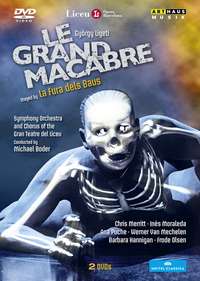|
Back
02/21/2013
György Ligeti: Le Grand macabre
Chris Merritt (Piet the Pot), Inés Moraleda (Amando), Ana Puche (Amanda), Werner Van Mechelen (Nekrotzar), Frode Olsen (Astradamors), Ning Liang (Mescalina), Barbara Hannigan (Venus/Gepopo), Brian Asawa (Prince Go-Go), Francisco Vas (White Minister), Simon Butteriss (Black Minister), Gabriel Diap (Ruffiak), Miquel Rosales (Schablack), Ramon Grau (Schabernack), Symphony Orchestra and Chorus of the Gran Teatre del Liceu, José Luis Basso (Chorus Master), Michael Boder (Conductor), Alex Ollé (La Fura dels Baus) in collaboration with Valentina Carrasco (Stage Director), Alfons Flores (Set Designer), Lluc Castells (Costume Designer), Peter van Praet (Lighting Designer), Franc Aleu (Video), Havi Bové (Video Director)
A production of Unitel Classica, Gran Teatre del Liceu (Barcelona), Théâtre Royal de la Monnaie (Brussels), Opera di Roma, English National Opera (London)
Recorded live at the Gran Teatre del Liceu, Barcelona (November 2011) – 122’
Arthaus Musik # 101 643 – Booklet in English, French and German – Subtitles available in Italian, English, German, French, Spanish, Chinese, Korean and Japanese

   
Opinions will be decidedly mixed regarding the content and artistic interpretation of György Ligeti’s 1978 opera Le Grand macabre. One must, however, take a step back in time to get a sense of basis for his aberrant work. Ligeti began operatic compositions at around the age of 50 due to the tenuous political climate of 1930-1950 that was looming over Hungary, certainly stifling any liberal form of musical expression. It was not until 1956 when Ligeti moved to Vienna that he joined the avante-garde crowd whose musical objectives centered around development of electric music. It would be easy to assume that Ligeti’s childhood repression unleashed a musical outpouring filled with great satire and cynicism. Driven by the Dadaism movement, his later compositions began to reach into the dichotomous blend of frivolity and torment that ultimately led him to the creation of Le Grand macabre, a story split into four sections (two acts) which handle the subject of death with surrealism and farcical rawness. Ligeti sought the quintessential question: how does one live their life? Does one cower and dread an impending death or does one live life to its fullest even to the point of hedonistic tendencies? Such is the crux of the opera.
Few eyebrows are unlikely raised within the Liceu even though this Alex Ollé/Valentina Carrasco staging borders on unabashed vulgarity and bawdiness. Puritanical Americans would likely be aghast, so America, take note! Ollé’s digital theatrical concepts alongside Peter van Praet’s highly visual and effective lighting and Alfons Flores’ ingenious set design (using Hitchcock-like film techniques to freeze and transpose onto a physically nude female constructed body on stage in prostrate position, using virtually all body orifices as passageways for characters to enter and leave the stage), are key components in keeping eyes glued to the stage. Though certainly a bit cagy and crass, logical arguments can be realized when one seriously reads the synopsis and the work’s core intentions.
The cast is well prepared: Werner Van Mechelen anchors with power, and he is the macabre emcee to the “countdown to Armegeddon”, continually reminding all of the impending midnight apocalypse by addictively checking his hourglass. The never-so-sober Chris Merritt as Piet the Pot is befriended by not only Nekrotzar (Van Mechelen) but also by Astradamors performed by Frode Olsen. Piet also finds the unrelenting lovers, Amando and Amanda, sung by Inés Moreleda and Ana Puche, respectively, who radiate fine upper soprano harmony and provide clearly suggestive passionate love making that is accentuated by horn squeaks from the orchestra. Ning Liang is a bit feisty and over-crazed S&M addict who adds a bit of out-of-bounds vulgarity with whip in hand, and at times, wields a drug syringe. Playing dual roles of Venus and Gepopo, Barbara Hannigan elicits extremely energetic and acrobatic prowess in the latter role as the frenzied, overstressed intelligence officer. She adds quite a bit of hilarity.
Royal and ministerial elements within the legendary kingdom of Breughelland are highly comical and preposterous. Countertenor Brian Asawa delights us as the particularly affected Prince Go-Go while the black and white ministers, Simon Butteriss and Francisco Vas, respectively, add a bit of slap-stick humor that’s superficially profound. It’s interesting to see the meticulousness each singer possesses by holding an ending note with firmato. This trait is effective and demonstrates the casts’ preparedness.
Le Grand macabre jabs at composers’ earlier works by subtlety interspersing brief musical ditties into the score, in what Ligeti calls, “fake quotations, synthetic quotations.” The opera was written for the Royal Opera in Stockholm in 1974-1977. A greater amount of dialogue was originally created by Ligeti in the opera’s first go-through, but in 1996 he made significant changes to the score, severely cutting the amount of spoken text. In this production (and now the preferred version) it’s an amalgam of mumbled opéra comique, derivative recitativo secco and fleeting recitative accompagnato.
Perhaps the best example of honoring (or humiliating) earlier classical compositions by Rossini (i.e. Il barbiere di Sigivlia), Mozart (i.e. Don Giovanni and even Verdi (i.e. Falstaff) is the manner in which all principal cast members slowly move stage front and sing in canonic form before the curtain’s close. No doubt, György Ligeti was troubled by devising a piece that dealt with the ongoing debate of emotions versus intellect at life’s end. Canvassing the history and transformation of Le Grand macabre, maybe Ligeti was thinking in terms of Falstaff’s final words from Verdi’s final opera: “he who laughs last, laughs best.”
Christie Grimstad
|